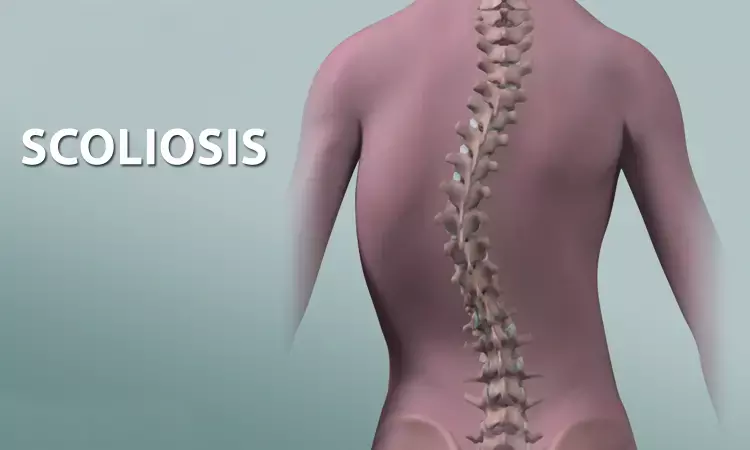- Home
- Medical news & Guidelines
- Anesthesiology
- Cardiology and CTVS
- Critical Care
- Dentistry
- Dermatology
- Diabetes and Endocrinology
- ENT
- Gastroenterology
- Medicine
- Nephrology
- Neurology
- Obstretics-Gynaecology
- Oncology
- Ophthalmology
- Orthopaedics
- Pediatrics-Neonatology
- Psychiatry
- Pulmonology
- Radiology
- Surgery
- Urology
- Laboratory Medicine
- Diet
- Nursing
- Paramedical
- Physiotherapy
- Health news
- Fact Check
- Bone Health Fact Check
- Brain Health Fact Check
- Cancer Related Fact Check
- Child Care Fact Check
- Dental and oral health fact check
- Diabetes and metabolic health fact check
- Diet and Nutrition Fact Check
- Eye and ENT Care Fact Check
- Fitness fact check
- Gut health fact check
- Heart health fact check
- Kidney health fact check
- Medical education fact check
- Men's health fact check
- Respiratory fact check
- Skin and hair care fact check
- Vaccine and Immunization fact check
- Women's health fact check
- AYUSH
- State News
- Andaman and Nicobar Islands
- Andhra Pradesh
- Arunachal Pradesh
- Assam
- Bihar
- Chandigarh
- Chattisgarh
- Dadra and Nagar Haveli
- Daman and Diu
- Delhi
- Goa
- Gujarat
- Haryana
- Himachal Pradesh
- Jammu & Kashmir
- Jharkhand
- Karnataka
- Kerala
- Ladakh
- Lakshadweep
- Madhya Pradesh
- Maharashtra
- Manipur
- Meghalaya
- Mizoram
- Nagaland
- Odisha
- Puducherry
- Punjab
- Rajasthan
- Sikkim
- Tamil Nadu
- Telangana
- Tripura
- Uttar Pradesh
- Uttrakhand
- West Bengal
- Medical Education
- Industry
Polygenic risk score can predict children's risk of developing scoliosis: Study

Japan: The researchers from Japan have developed and validated a genetic risk score for predicting the onset and severity of adolescent idiopathic scoliosis (AIS) -- the most common type of scoliosis in adolescents. The use of the score may help clinicians to identify children at risk of developing AIS who could benefit from preventive therapies.
"We found that a risk score based on genome-wide association study data could predict not only susceptibility to AIS, but also its severity. We hope our findings will be useful for personalized medicine," the researchers reported in the Journal of Bone and Mineral Research.
AIS is a common disease that causes spinal deformities in as many as 3% of youth. There is an immediate need for developing a method that can accurately detect the onset and progression of AIS. Because AIS has a high heritability of 87.5%, prediction of its onset and progression based on genetic data is a promising option. The researchers showed the usefulness of polygenic risk score (PRS) for the prediction of onset and progression of AIS.
Chikashi Terao, Chikashi Terao, the RIKEN Center for Integrative Medical Sciences, Japan, and colleagues used AIS genomewide association study (GWAS) data comprising 79,211 subjects in three cohorts and constructed a PRS based on association statistics in a discovery set including 31,999 female subjects. After calibration using a validation data set, PRS was applied to a test data set.
Key findings of the study include:
- By integrating functional annotations showing heritability enrichment in the selection of variants, the PRS demonstrated an association with AIS susceptibility (p = 3.5 × 10−40 with area under the receiver-operating characteristic [AUROC] = 0.674, sensitivity = 0.644, and specificity = 0.622).
- The decile with the highest PRS showed an odds ratio of as high as 3.36 to develop AIS compared with the fifth in decile.
- The addition of a predictive model with only a single clinical parameter (body mass index) improved predictive ability for development of AIS (AUROC = 0.722, net reclassification improvement [NRI] 0.505 ± 0.054), potentiating clinical use of the prediction model.
- The researchers found the Cobb angle (CA), the severity measurement of AIS, to be a polygenic trait that showed a significant genetic correlation with AIS susceptibility (rg = 0.6).
- The AIS PRS demonstrated a significant association with CA.
"These results indicate a shared polygenic architecture between onset and progression of AIS and the potential usefulness of PRS in clinical settings as a predictor to promote early intervention of AIS and avoid invasive surgery," concluded the authors.
June is Scoliosis Awareness Month.
Reference:
The study titled, "Polygenic Risk Score of Adolescent Idiopathic Scoliosis for Potential Clinical Use," is published in the Journal of Bone and Mineral Research.
DOI: https://asbmr.onlinelibrary.wiley.com/doi/10.1002/jbmr.4324
Hina Zahid Joined Medical Dialogue in 2017 with a passion to work as a Reporter. She coordinates with various national and international journals and association and covers all the stories related to Medical guidelines, Medical Journals, rare medical surgeries as well as all the updates in the medical field. Email: editorial@medicaldialogues.in. Contact no. 011-43720751
Dr Kamal Kant Kohli-MBBS, DTCD- a chest specialist with more than 30 years of practice and a flair for writing clinical articles, Dr Kamal Kant Kohli joined Medical Dialogues as a Chief Editor of Medical News. Besides writing articles, as an editor, he proofreads and verifies all the medical content published on Medical Dialogues including those coming from journals, studies,medical conferences,guidelines etc. Email: drkohli@medicaldialogues.in. Contact no. 011-43720751


